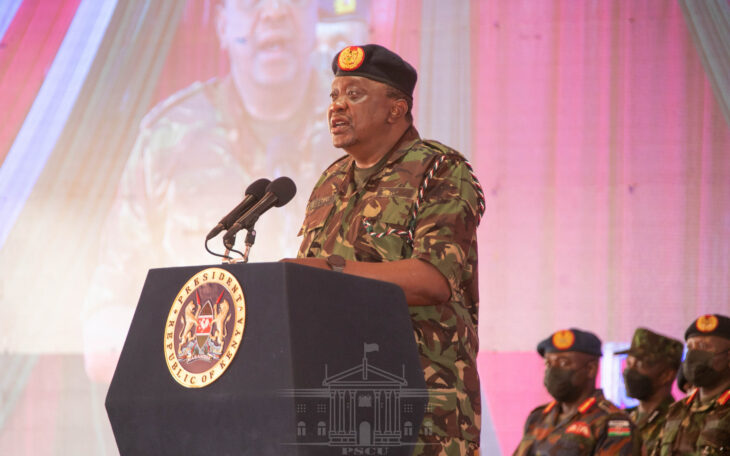NAIROBI,Kenya, Nov, 12 – President Uhuru Kenyatta during a meeting with the National Security Council Friday called on all security agencies to be on high alert in the wake of the unfolding security situation in the region.
According to State House spokesperson Kanze Dena, “his excellency president Uhuru Kenyatta has directed internal security institutions to heighten vigilance and surveillance across the country.”
Recently the country’s security apparatus revealed that they were mobilizing resources to respond to any possible eventuality at the Ethiopian border with Kenya following the declaration of a nationwide state of emergency by prime minister Abiy Ahmed.
The declaration came after the Tigray People’s Liberation Front (TPLF) said it had captured two cities about 400km from Addis Ababa.
There are concerns of an influx of refugees into Kenya if the war persists.
Countries in the Horn of Africa and Great Lakes Region have in recent weeks experienced a series of tumultuous events as a result of the rapidly changing social-political dynamic landscape, in turn threatening the security and stability of various nations.
From terror attacks in Uganda and the Democratic Republic of Congo (DRC) to the ongoing hostilities in Northern Ethiopia to a military coup in Sudan and political instability in Somalia.
Amidst the increasing political temperatures and terror attacks, Kenya seems to be an island of peace in a sea of unrest.
Diplomacy experts say that Kenya’s eyes and ears should be alert, in case events further North become a regional conundrum.
“One thing we have to realise is that the history of our countries and the challenges they face. Challenges of state formation, the separation of Sudan into two different countries, especially affected the North,” Dr. Mumo Nzau, Diplomacy, and Security Scholar told Shahidi News.
Across the border, Ethiopia has continued its onslaught against rebels in its Tigray region, a matter that Kenya has said before is looking at with a keen eye.
“The problems in Tigray are those of state formation. There is no country that would want one part of it to secede or break out. However, how certain contentious matters are handled and weaned out are very important so that they don’t jeopardise sub-regional security and stability,” he said.
War broke out a year ago in the northern Tigray region.
The TPLF has since advanced into the neighbouring regions of Amhara and Afar.
Thousands of people have been killed and more than two million have fled their homes since the conflict began.
International efforts to broker a ceasefire between the government and the rebels, who initially fell out over Prime Minister Ahmed Abiy’s political reforms, have so far failed.
Ethiopia last imposed such a measure in February 2018 for six months ahead of the transition of power to Abiy. Curfews were enforced and people’s movements restricted, while thousands of people were detained.
The TPLF had dominated Ethiopian politics for nearly three decades but lost much influence when Abiy took office in 2018 following years of anti-government protests.
Relations with the TPLF soured after they accused him of centralising power at the expense of Ethiopia’s regional states – an accusation Abiy denies.
At the time, TPLF spokesperson Getachew Reda said that if Tigrayan forces and their allies succeeded in removing the government, they would establish an interim government. “If the government falls, we will definitely have an interim arrangement.”
Earlier this week, the African Union and the United States expressed optimism that there could be an opportunity to end the war in Ethiopia, even as the United Nations warned that the risk of Ethiopia spiralling into a widening civil war is “only too real.”
The AU envoy for the Horn of Africa, former Nigerian President Olusegun Obasanjo, and U.N. political affairs chief Rosemary DiCarlo both briefed the U.N. Security Council.
Speaking from Ethiopia, Obasanjo said that by the end of the week “we hope to have a program in hand that will indicate” how they can achieve humanitarian access and a withdrawal of troops that satisfies all the parties. The United Nations estimates 400,000 people in the northern region of Tigray are living in famine-like conditions following a year of war.
“All these leaders, here in Addis Ababa and in the north, agree individually that the differences between them are political and require a political solution through dialogue,” Obasanjo told the 15-member council, but stressed: “The window of opportunity we have is very little and that time is short.”
The African Union earlier on Monday held a closed-door meeting to discuss the crisis.
Additional reporting By Reuters.
Want to send us a story? Contact Shahidi News Tel: +254115512797 (Mobile & WhatsApp)


